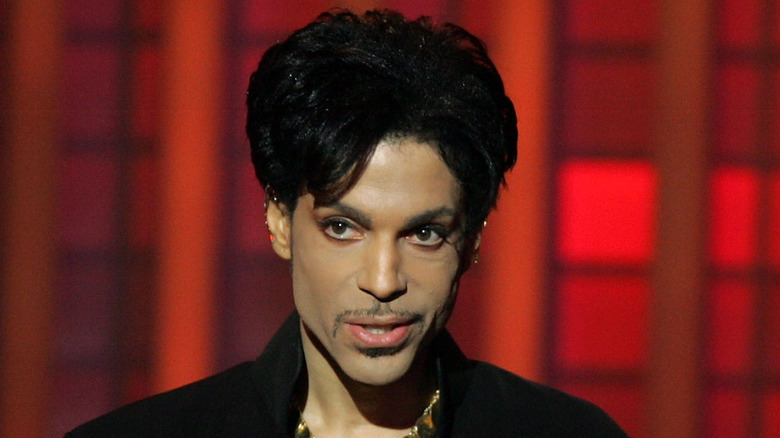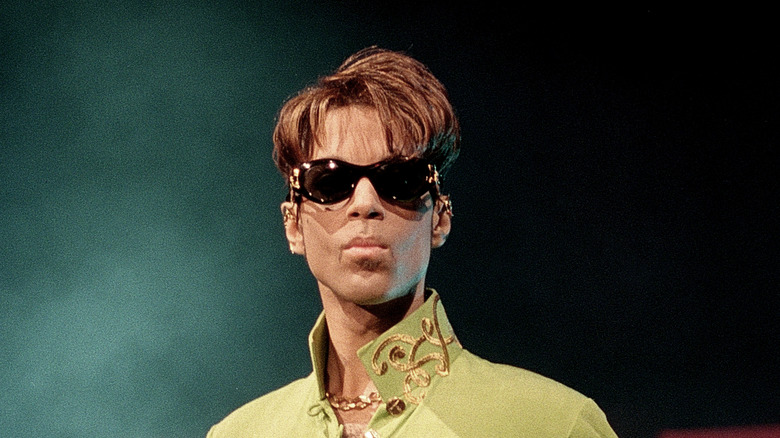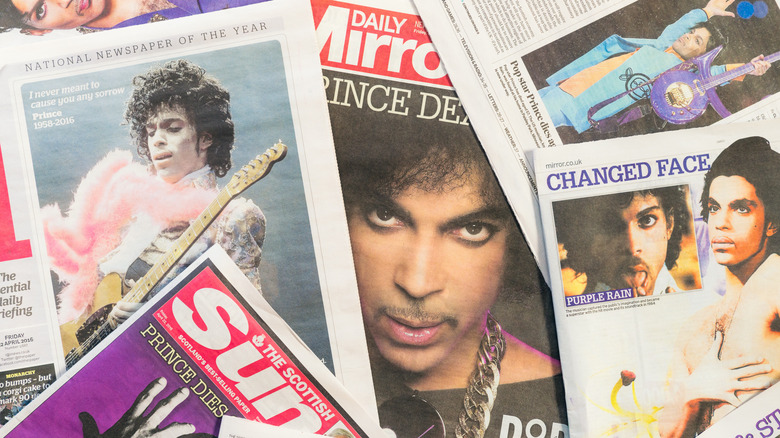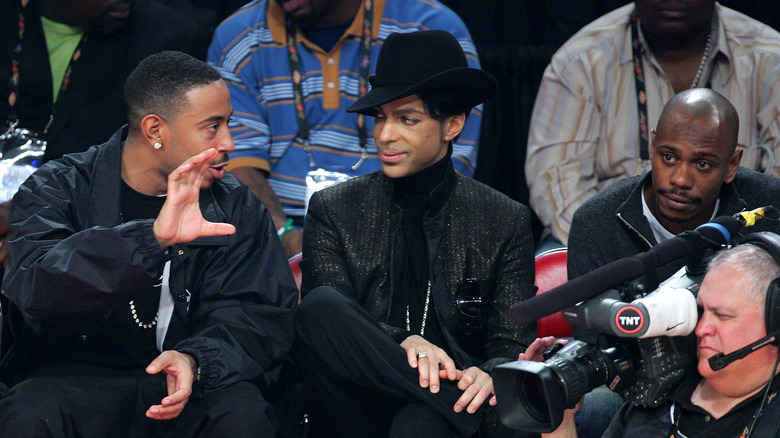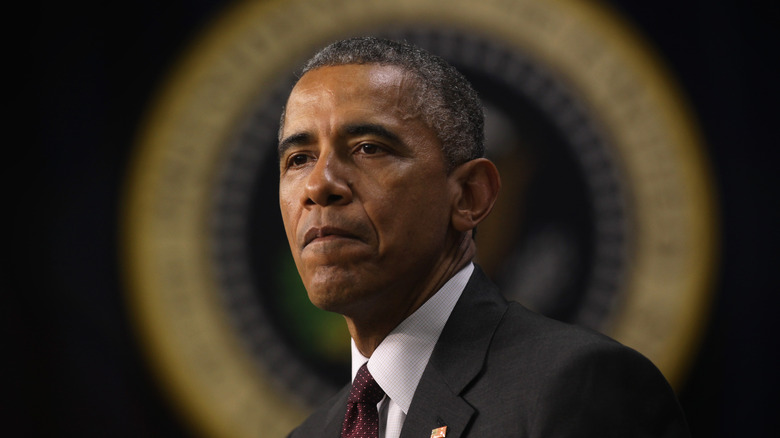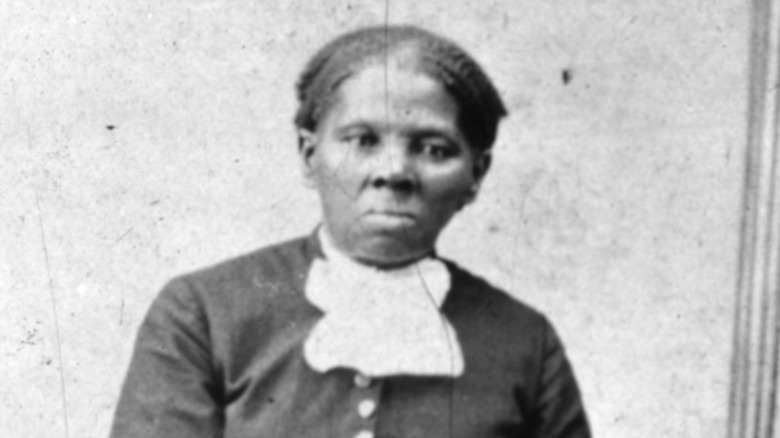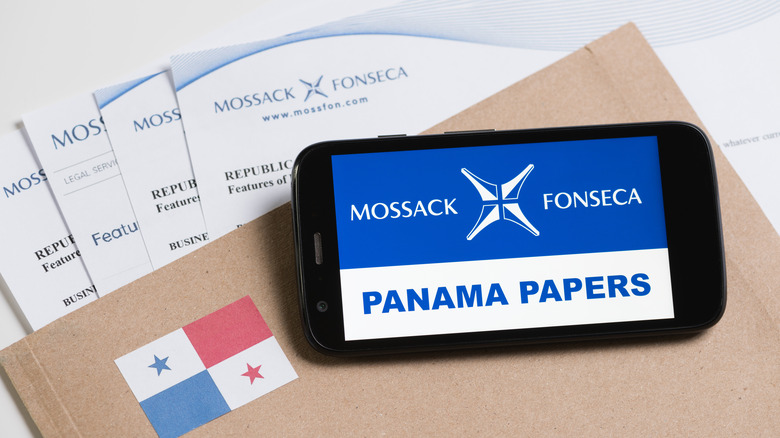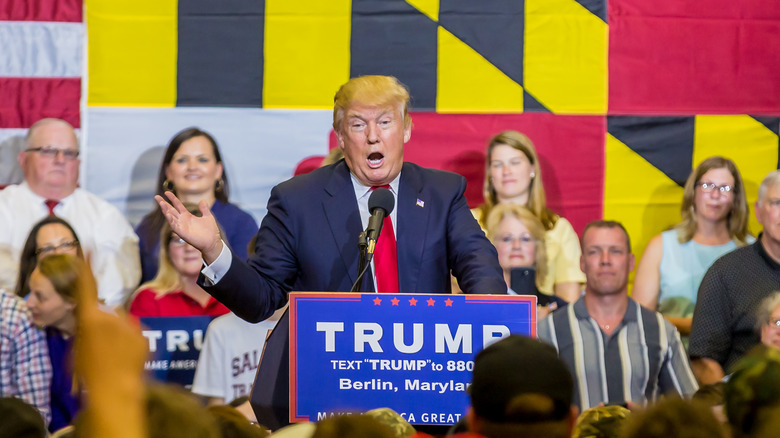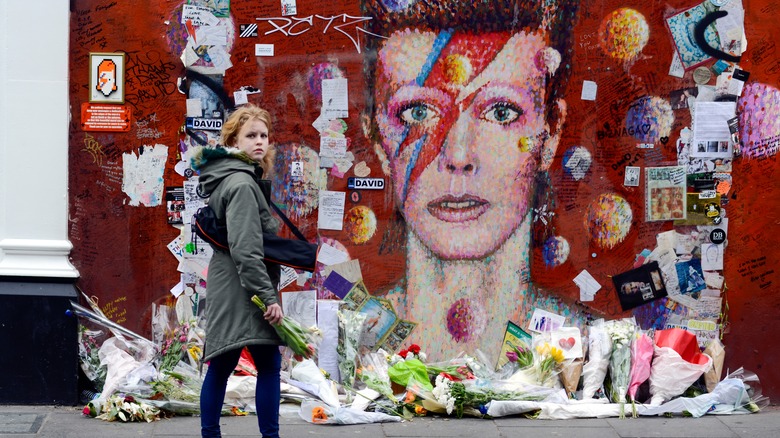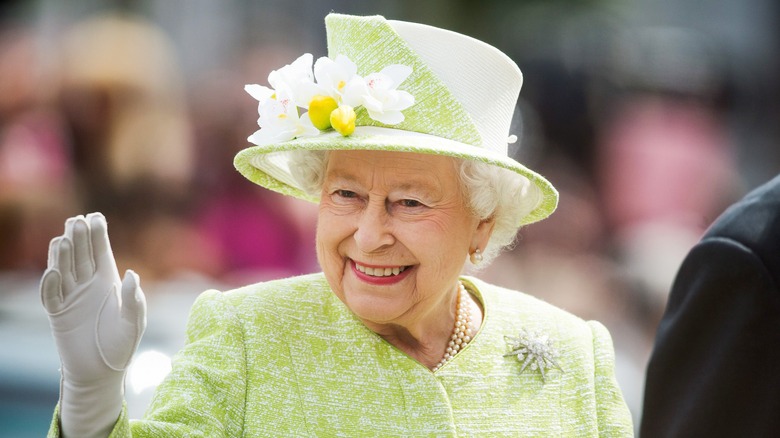What It Was Really Like The Day Prince Died
Major events have a tendency to take over the day they happen on. Sometimes, the event is so monumental that this is entirely justified. While there were obviously plenty of other things happening on September 11, 2001, we can only speculate on what life would be like if 9/11 never happened because the day's terrorist attacks came to define the date so conclusively.
On other occasions, a certain day ends up being remembered for a smaller yet impactful event — such as the death of a particularly influential individual. For instance, December 8, 1980, is largely known as the day John Lennon died. Of course, this is a little unfair. Any individual day is a part of a grander scheme of things that can include anything from small, localized events to great social change and other world-shaping developments, so associating them with just one person can heavily downplay everything else going on at the time.
Take April 21, 2016. It was a fairly eventful Thursday, but if you ask music fans, its defining aspect is that it was the day Prince Rogers Nelson died at the age of 57. While the death of one of the world's most prominent pop artists is a great tragedy, it was ultimately just one thread in the great web of events that were unfolding that day. Let's take a look at what life was like on the day Prince died, and how his death affected its course.
Prince died of an accidental overdose
Prince Rogers Nelson died on April 21, 2016, of an accidental drug overdose. The artist was found in an elevator inside his Paisley Park mansion, and we soon learned after Prince's death that he had been quietly going through a tough time. An investigation into the circumstances of Prince's final days and untimely death would eventually determine that the musician had grown frail and was dealing with considerable, potentially career-debilitating pain. Apart from hip pains, his fingers were also giving him trouble, and to manage his situation Prince had at some point turned to opioid painkillers. Prince's peers knew him as an advocate of a drug-free lifestyle, which may or may not be why he sourced at least some of his painkillers covertly under the name of his bodyguard, Kirk Johnson. However, he took other medication as well, which is what ultimately killed him.
The pills that killed Prince weren't prescription medication. Instead, they were extremely powerful fentanyl pills that were mislabeled as a weaker drug. Prince, who only weighed around 110 pounds at the time, didn't know how strong the pills were, and ended up accidentally taking a lethal dose. Its still unclear just who he got the deadly drug from.
Tragically, this wasn't Prince's first overdose. On April 14 — just a week before his death — his plane had to make an emergency landing after a concert and he had to be revived.
If you or anyone you know needs help with addiction issues, help is available. Visit the Substance Abuse and Mental Health Services Administration website or contact SAMHSA's National Helpline at 1-800-662-HELP (4357).
The media was quick to arrive on the scene
The death of a celebrity of Prince's magnitude was virtually guaranteed to jump-start a barrage of media coverage as soon as the press caught wind of it, and due to the sudden and shocking nature of his death, this didn't take long. To give you an idea of how quickly the news started covering the artist's death on April 21, 2016, it's worth looking at the experience through the eyes of some of the first reporters on the scene.
Journalists from Minnesota's local WCCO News were the first to cover the news. Esme Murphy of the channel happened to be on a courtroom assignment at the time, and got to experience the tumult the information of Prince's passing caused firsthand. "I remember being in that courtroom and just suddenly the deputies were running out and their pagers were going off, the radios were going off, my phone was going off," she told CBS News. "I called the station and they said, 'Someone has died at Paisley Park and we think it's Prince, and we want you to go there right away.'"
As first responders dealt with the situation, the media all over the world was quick to react to the shocking development. Prince's death soon made global headlines as major outlets all across the world sang the musician's praises and reacted to his passing.
Prince's death prompted mournful reactions from many celebrities
Even the people who didn't catch up on the news for one reason or other on April 21, 2016, soon knew what was up — at least, provided that they took a moment of their day to browse social media. Since the news of Prince's death broke on the day of his passing, it didn't take long for the entertainment industry to react. From Spike Lee and Alicia Keys to Katy Perry and Lin-Manuel Miranda, notables from all fields of entertainment were soon posting their stunned reactions to the star's death, and even high-ranking politicians from Prince's native Minnesota pitched in with heartfelt messages.
Dave Chappelle, who was a longtime friend of Prince and was known to lampoon the star, was among the first people to know because a journalist friend called him before the death hit the news. In a 2017 interview with The New York Times, the comedian downplayed the strength of the pair's relationship, but was more than happy to discuss Prince's influence on others. "He fostered a community among artists," Chappelle said. "He used to have these parties where we would go over to his house, and there would be all these musicians that I admired, and they'd just do these jam sessions in the basement. Everybody at the party was playing something. I think when he died there was the icon dying, but then there was this pillar in the community of people dying."
Even the president found the time to honor Prince
Prince's death on April 21, 2016, was such a notable event that even the most powerful person in the world jumped into the fray. Barack Obama was having the kind of busy time you'd expect a president to have. On the same day, he was visiting Riyadh, Saudi Arabia, a difficult and headline-making visit considering his strained relationship with the country. On April 22, he would embark on a busy three-day visit to the U.K. Yet, despite his hectic schedule, he found the time to react to Prince's death on the same day the artist died.
It says a lot about a musician when one of the voices praising them and their legacy is the president of the United States, and what's more, Obama's message wasn't just a run-of-the-mill condolence. Instead, his lengthy message made clear just how much he valued Prince and his work. "Few artists have influenced the sound and trajectory of popular music more distinctly, or touched quite so many people with their talent," the president's Facebook statement read (via Rolling Stone). "As one of the most gifted and prolific musicians of our time, Prince did it all. Funk. R&B. Rock and roll. He was a virtuoso instrumentalist, a brilliant bandleader, and an electrifying performer. 'A strong spirit transcends rules,' Prince once said. And nobody's spirit was stronger, bolder or more creative. Our thoughts and prayers are with his family, his band and all who loved him."
The $20 bill started a significant but slow overhaul
When Prince died, the U.S. government was making arrangements to honor a very different kind of historic trailblazer: Harriet Tubman. The U.S. Treasury had just announced that the famous Underground Railroad conductor and abolitionist would be the new main face on the $20 bill, which would relocate the incumbent Andrew Jackson to a less prominent position on the back of the note. Furthermore, several other prominent female activists were set to feature in the new bank note designs, along with civil rights leader Martin Luther King Jr. Tubman's $20 bill, in particular, was something President Barack Obama had been pushing since 2014.
However, this change is yet to materialize. Donald Trump, who became president after Obama, didn't exactly support the idea of the new bills, seeing as he spoke against the idea on the very day Prince died. During an April 21, 2016, "Today" show town hall appearance, Trump was asked about the subject and dismissed the idea of Tubman replacing Andrew Jackson on the bill. "Well, Andrew Jackson had a great history, and I think it's very rough when you take somebody off the bill," Trump said (via CNN). "I think Harriet Tubman is fantastic, but I would love to leave Andrew Jackson or see if we can maybe come up with another denomination." This hasn't happened quite yet. However, it seems that the slow process is still going on behind the scenes — with the deadline for the redesigned $20 bill being the year 2030.
The fallout from the Panama Papers was in full swing
April 2016 is notorious for a major and wide-spanning scandal that was in full swing at the time of Prince's death. Early in the month, news outlets published findings from a years-long study of a massive data leak from a Panama-based law company, Mossack Fonseca. The reports implicated a number of famous figures for using offshore financial services, which opened up a possibility for potential shady money activities done with shell companies and other tactics. Family members and close allies of major figures from Russia's President Vladimir Putin and China's Xi Jinping to Britain's Prime Minister David Cameron were named in the documents. Many names from the entertainment world also appeared, from Jackie Chan and Simon Cowell to Emma Watson and Stanley Kubrick. Prince Rogers Nelson, for the record, didn't appear in the papers.
Some, like Watson, divulged that they had used Mossack Fonseca's services for privacy reasons alone, but the Panama Papers scandal did end a few careers. Iceland's Prime Minister Sigmundur Davið Gunnlaugsson had to resign shortly after people started protesting his involvement in offshore financial activities, and the same happened to his Pakistani counterpart Nawaz Sharif after the papers exposed details about his family members' real estate ownership. The scandal eventually took 28 Mossack Fonseca-affiliated people to court for their alleged roles in various Panama Papers-themed scandals. However, all of them were ultimately acquitted when the long-running case came to an end on June 28, 2024.
Donald Trump's road to Republican presidential nominee featured some surprising comments
On April 21, 2016, the road to the United States presidential election was in full swing. Eventual winner Donald Trump wasn't yet the official Republican nominee and wouldn't be until the Republican National Convention on July 19. However, he was already making plenty of waves.
Strangely enough, the day Prince died featured some comments from the future president that wouldn't make it to a list of the worst things Trump has said. On this day, he was the centerpiece of NBC's "Today" show in Rockefeller Center, New York City. There, he made headlines by siding with transgender people in the raging debate on what bathroom they should use, remarking that they should simply use the one they deem appropriate. Trump's fellow Republican presidential hopeful and political opponent Ted Cruz was all too happy to use Trump's comments on the subject as a blunt instrument in his ultimately losing campaign.
In the interest of full coverage, of course, Trump didn't exactly turn out to be a staunch LGBTQ+ ally despite his comments on April 21. His later impact on the LGBTQ+ community has been considerably worse, to the point that in 2024 he threatened to restrict trans rights should he win the year's presidential election. As it happens, these restrictions include the reversal of a policy that allows students to use bathrooms that correspond with their gender identity.
The world was still reeling from other prominent deaths
Prince's death was a pivotal moment in a year that became infamous for the sheer amount of its celebrity deaths. He wasn't the first legendary musician who passed away before his time in 2016, either. When the news of his death arrived, music aficionados were still dealing with the death of David Bowie at 69. An artist to the end, Bowie died on January 10 from cancer that few people had known about — just in the wake of his last tragic single, "Lazarus," and two days after his final album came out. If that wasn't enough, beloved actor Alan Rickman died only four days after Bowie — also aged 69, and also after privately dealing with cancer.
After such blows so early in the year, 2016 was already off to a bad start on this particular front, so after Prince's death on April 21, it was easy to start suspecting that 2016 was far from done. In fact, such assumptions would turn out to be tragically correct. Before the year ended, the world of entertainment mourned prominent people such as Anton Yelchin, Muhammad Ali, Gene Wilder, Leonard Cohen, Carrie Fisher, Debbie Reynolds, and George Michael — several of whom passed away suddenly and extremely prematurely. Against such a backdrop, it's no surprise that many people ended up believing the wild 2016 Cormac McCarthy death hoax that even fooled a mainstream news outlet.
Equador was recovering from a major earthquake
Natural disasters are rarely pleasant, and a particularly nasty one that struck Ecuador in 2016 was in the news mere days before Prince died. People who remember this time may also recall the massive 7.8-magnitude earthquake that struck the South American country on April 16, 2016, destroying numerous buildings and other infrastructure. The disaster's human cost was immense, with over 660 dead and an estimated 16,600 injured. Authorities had to find shelter for more than 24,000 people in the aftermath, some areas were left completely without functional infrastructure, and supply delivery was a challenge because many roads had sustained heavy damage.
What's more, this wasn't just a single quake. On April 20, a smaller 6.2-magnitude quake hit the area, utterly devastating the people who were dealing with the first one's aftermath. On May 18, two other earthquakes with magnitudes of 6.8 and 6.7 would hit the same area. Like the April 20 one, they caused quite a bit less devastation than the first large quake, but were an uncomfortable experience for the population nevertheless.
Queen Elizabeth II had a big day
While Prince's death was the headline-dominating tragedy of April 21, 2016, there's little question about the biggest birthday of that same date — at least, in Great Britain. It just so happens that this was the day Queen Elizabeth II, Britain's longest-serving monarch, turned 90. It was a pretty big deal in the country, and as such, got quite a bit of attention from the media and the public. In fact, not content with just celebrating the queen's birthday once, the country had multiple events in store.
Since a full-on formal celebration — complete with parades, a huge picnic, and other activities — wouldn't take place until June, Queen Elizabeth II kept things relatively low-key on and around her actual birthday. Of course, what's low-key for a monarch doesn't necessarily count as such for the average person. As such, her birthday featured the release of some official photographs, and plenty of attention from others. High-ranking politicians were lining up to pay tribute to the ruler, and members of the royal family shared stories about her. The queen herself took a so-called "birthday walkabout" where she greeted members of the public. All in all, it was a gleeful sort of national event for monarchy-minded Brits — a far cry from the tragedy playing out at Paisley Park to be sure, but also a good reminder that these two radically different events can easily coexist at the same time.
